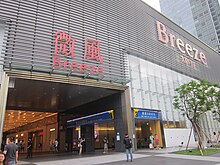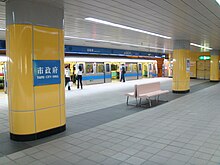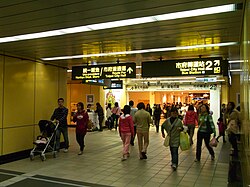Taipei City Hall metro station
| Taipei metro station | |||||||||||||||||
 Platform | |||||||||||||||||
| Chinese name | |||||||||||||||||
| Chinese | 市政府 | ||||||||||||||||
| Literal meaning | City government | ||||||||||||||||
| |||||||||||||||||
| General information | |||||||||||||||||
| Location | 2 Sec 5 Zhongxiao E Rd Xinyi District, Taipei Taiwan | ||||||||||||||||
| Coordinates | 25°02′28″N 121°33′59″E / 25.0411°N 121.5663°E | ||||||||||||||||
| Construction | |||||||||||||||||
| Structure type | Underground | ||||||||||||||||
| Bicycle facilities | Access available | ||||||||||||||||
| Other information | |||||||||||||||||
| Station code | BL18 | ||||||||||||||||
| Website | web | ||||||||||||||||
| History | |||||||||||||||||
| Opened | 1999-12-24[1] | ||||||||||||||||
| Passengers | |||||||||||||||||
| 2016 | 140,285 daily (December 2020)[2] | ||||||||||||||||
| Rank | (Ranked 3rd of 109) | ||||||||||||||||
| Services | |||||||||||||||||
| |||||||||||||||||
Taipei City Hall (Chinese: 市政府; pinyin: Shìzhèngfǔ) is a metro station in Taipei, Taiwan served by Taipei Metro.
Station overview
[edit]

The two-level, underground station structure with an island platform and four exits. The size of the station is larger than most other stations on the Nangang Line.[3] The station is situated under Zhongxiao East Road, between Keelung Road and Songren Road. Washrooms are located outside of the fare area of the station. Due to crowding during New Year's festivities, automatic platform gates have been installed at this station.[4][5]
In recent years, the station has gone through renovations to connect it with a bus transfer station, mall, and hotel above.[6] The Taipei City Hall Bus Station opened for service on 5 August 2010.[7]
In February 2009, a 105.3 m (345 ft)-long vegetal wall was unveiled at the station for a two-month exhibition. It was expected to absorb 35.445 kg (78.14 lb) of carbon dioxide while releasing 26.094 kg (57.53 lb) of oxygen.[8]
Public art
[edit]Numerous pieces of public art are situated in and around the station. A series of five sculptures (titled "Growth") are placed around the station.[9] "Furrows" and "Push" (granite/marble) are located in entrance square, while "Sprout", "Twist", and "Sway" (bronze/aluminum statues) are located on the station platform.
Station layout
[edit]| Street Level | Entrance/Exit | Entrance/Exit |
| B1 | Concourse | Lobby, information desk, automatic ticket dispensing machines, one-way faregates, Restrooms(West side, outside fare zone near exit 2) |
| B2 | Platform 1 | ← |
| Island platform, doors will open on the left | ||
| Platform 2 | → | |
Exits
[edit]- Exit 1: Song Shan Senior High School/United Daily News Office
- Exit 2: Taipei City Hall Bus Station/Uni-Ustyle Department Stores
 , Eslite Bookstore, Taipei City Hall
, Eslite Bookstore, Taipei City Hall - Exit 3: Xinyi Shopping District/Breeze XIN YI
- Exit 4: TCWC Children Home
Operations
[edit]Because the station is underneath Zhongxiao East Road and nearby the newly developed Xinyi District, the Taipei City Hall station is one of the most widely used station in the Taipei Metro. In 2008, the station handled 86,967 passengers (entries/exits) per day.[10] Since the opening of the Taipei City Hall Bus Station, daily ridership increased during November 2010 to 116,400,[11] becoming the second-busiest station, only behind Taipei Main Station. Due to the large crowd during weekends and rush hours, the parallel Xinyi Line has been constructed to disperse some of the crowds. To cope with crowds during New Year's Eve celebrations, designated trains pass through the station without stopping.[12]
The station is also a transit station for local and long-distance buses to Neihu, Sanchong, Xinzhuang, Luzhou, Jingmei, Muzha, and to Keelung, Taoyuan, Zhongli, Miaoli, Taichung, etc. A large bus transit terminal was constructed between the space of exit 1 and the United Daily News Office. The station also provides free shuttle bus transport to the Taipei 101 Financial Center and to the World Trade Center during major exhibitions.
| Year | Daily ridership |
|---|---|
| 2002 | 22,785 |
| 2003 | 23,892 |
| 2004 | 29,327 |
| 2005 | 30,608 |
| 2006 | 35,986 |
| 2007 | 39,379 |
| 2008 | 43,081 |
| 2009 | 43,633 |
| 2010 | 48,770 |
| 2011 | 58,390 |
| 2012 | 61,871 |
| 2013 | 64,606 |
| 2014 | 55,936 |
| 2015 | 56,764 |
| 2016 | 58,061 |
| 2017 | 59,947 |
| 2018 | 60,749 |
Around the station
[edit]
Transport
[edit]Government and financial organizations
[edit]- Taipei City Hall
- Taipei City Council
- Hong Kong Economic, Trade and Cultural Office
- Netherlands Trade and Investment Office
- Uni-President International Building
- Criminal Investigation Bureau
- Taipei Songshan High School
- Financial Data Center, Ministry of Finance
- CPC Corporation
- United Cooperation International Headquarters
- United Daily News Office
Entertainment
[edit]- Songshan Cultural and Creative Park
- Taiwan Design Center
- Taipei New Horizon
- Eslite Spectrum
- Uni-Ustyle Department Stores
- Breeze XIN YI
- BELLAVITA Shopping Center
- Eslite Xinyi Branch
- Shinkong Mitsukoshi
- VIESHOW Cinemas
- ATT 4 Fun
- Taipei World Trade Center
- Taipei International Convention Center
- Taipei World Trade Center International Trade Building
- Taipei 101
References
[edit]- ^ "Chronicles". Taipei Metro. 5 December 2013. Retrieved 10 October 2018.
- ^ "Passenger Volume at Taipei Rapid Transit Stations". Taipei Mass Rapid Transit Co., Ltd. 2021-01-15.
- ^ "Taipei City Hall". Archived from the original on 2010-08-08.
- ^ http://www.libertytimes.com.tw/2009/new/feb/12/today-taipei9-3.htm 防跳軌 捷運3站將設月台門- 自由電子報
- ^ http://61.222.185.194/?FID=6&CID=47840 台灣新生報 | 防跳軌 北捷增3站設月台門
- ^ Mo Yan-chih (2010-05-24). "Traffic chaos expected in Xinyi". Retrieved 2010-06-17.
- ^ "New Taipei City Hall Bus Station opens to commuters". Asia One News. 2010-08-06. Archived from the original on March 18, 2012. Retrieved 2010-08-07.
- ^ "Regional public transportation meeting opens in Taipei". The China Post. 2009-03-10. Retrieved 2010-12-11.
- ^ "Public Art on the Nangang Line". Department of Rapid Transit Systems. Retrieved 2010-12-07.
- ^ "Passenger Volume at Taipei Rapid Transit Station". Institute of Transportation, MOTC. 2009-12-14. Archived from the original on 2011-10-03. Retrieved 2010-06-17.
- ^ "臺北捷運各站旅運量" (PDF). Taipei City Government. Retrieved 2010-12-07.
- ^ "Taipei Metro Successfully Meets the Challenge of New Year's Eve Transport Service". Taipei Rapid Transit Corporation. 2011-01-01. Retrieved 2010-01-04.
